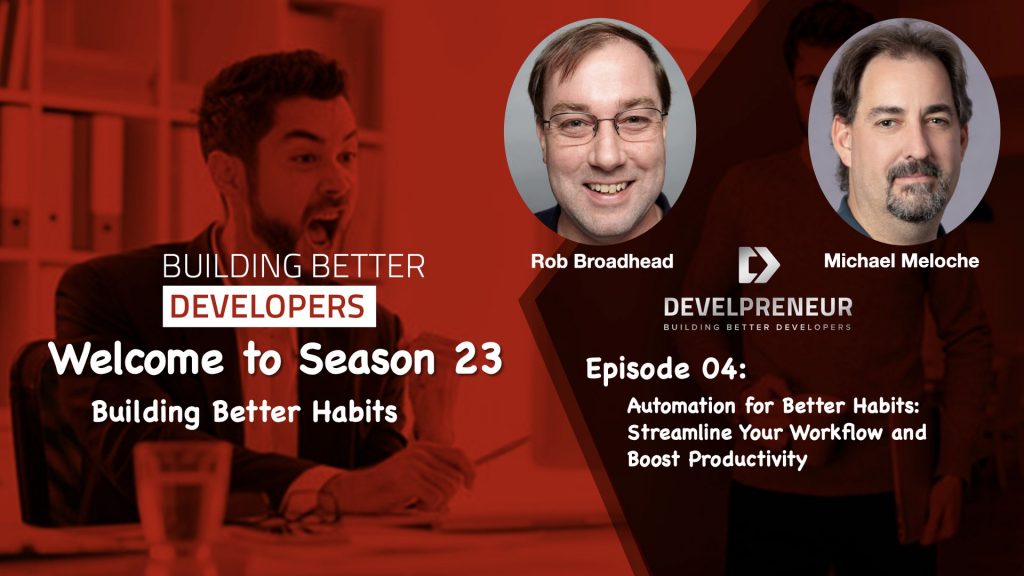Welcome to episode four of Building Better Developers. This season, we are focusing on “Building Better Habits.” This episode shows how automation can handle repetitive tasks in your daily routine. By automating mundane work, developers can focus more on creative and strategic projects. These automation practices help build a more efficient development process.
The Power of Automation in Development
This episode centers on how automation can dramatically improve productivity by eliminating repetitive tasks. The hosts highlight that developers often perform redundant tasks that, though small, can add up to significant time losses. They encourage listeners to reflect on their daily routines and pinpoint actions that automation could streamline. These might be running scripts, batch processing, or setting up CI/CD pipelines. Automating these tasks isn’t just about saving time—it also helps developers focus on higher-level work, which aligns with the season’s goal of cultivating productive, lasting habits.
A Challenge to Build an Automation Habit
Rob starts the episode by challenging listeners to track their daily tasks for a week. By logging the time spent on each activity, developers can more easily spot opportunities for automation. While seemingly quick, some tasks may take up substantial time over a week or month. Rob aims to help developers recognize areas where automation could eliminate or reduce these repetitive tasks, freeing them up for deeper work and problem-solving.
Rob shares an example from a previous episode where he implemented the Pomodoro technique. A 25-minute focus session helped him stay on track, achieving more in less time. This mirrors the goal of automating frequent tasks: once the manual effort is removed, developers regain precious minutes or even hours they can reinvest in other areas.
Targeting High-Value Tasks for Automation
Both hosts encourage listeners to prioritize automating high-value tasks that have the most significant impact on daily productivity. Examples include checking ticket statuses, logging into various applications, running reports, or deploying code. Developers can reduce the time spent on these recurring tasks by creating automated scripts or setting up batch processes. Michael explains how automating certain daily activities can streamline workflows and make each workday smoother and more productive.
The Developer’s Toolkit: Scripting, Macros, and More
Developers at all skill levels can benefit from automating their workflows using tools like scripts, macros, and batch processes. For example, A developer might execute several commands to set up a project each morning. Using automation, they can create a shell script to automate this setup, saving time and reducing errors. Another example looked at the value of using macros. These can be useful in applications like Excel, where automating data entry or calculations can benefit business developers.
The episode also dives into how non-coding tasks can benefit from automation. Rob and Michael mention tools like If This Then That (IFTTT) and Zapier, which allow users to set up automated online workflows without writing code. Whether it’s organizing files, batch-opening websites, or setting up automated alerts, these tools help streamline repetitive actions outside of coding.
Episode Challenge: Automate One Task
This episode challenges listeners to track their daily activities for a week and identify one repetitive task to automate. One task can be as simple as writing a script or macro to handle a recurring workflow. Another task, like setting up a CI/CD pipeline for code deployment, might be more complex. The aim is to find a process that takes up time every day. So spend an hour or two automating it and experience the time savings firsthand.
The goal is to make this an ongoing habit—automate one task this week and continue the practice in the following weeks. This small step can quickly add up, leading to more streamlined and productive workdays. Rob and Michael encourage listeners to share their experiences and successes, building a supportive community of developers focused on continuous improvement.
Final Takeaway: Commit to Small, Sustainable Changes
This episode of Building Better Developers offers practical guidance on how automating tasks can lead to better productivity and less mental fatigue. Remember to start with a tiny, repetitive task, automate it, and then gradually apply this practice to other tasks. By building automation into our daily routines, developers can maximize their time. Leading to a more enjoyable and efficient work experience.
Stay Connected: Join the Developreneur Community
The hosts invite listeners to explore resources like developer blogs, forums, and automation tools to enhance their automation journeys. By incorporating these habits into their work routines, developers can take proactive steps toward creating a more optimized workflow. That will contribute to both professional growth and improved coding skills. Contact us at [email protected] with your questions, feedback, or suggestions for future episodes. Together, let’s continue exploring the exciting world of software development.

